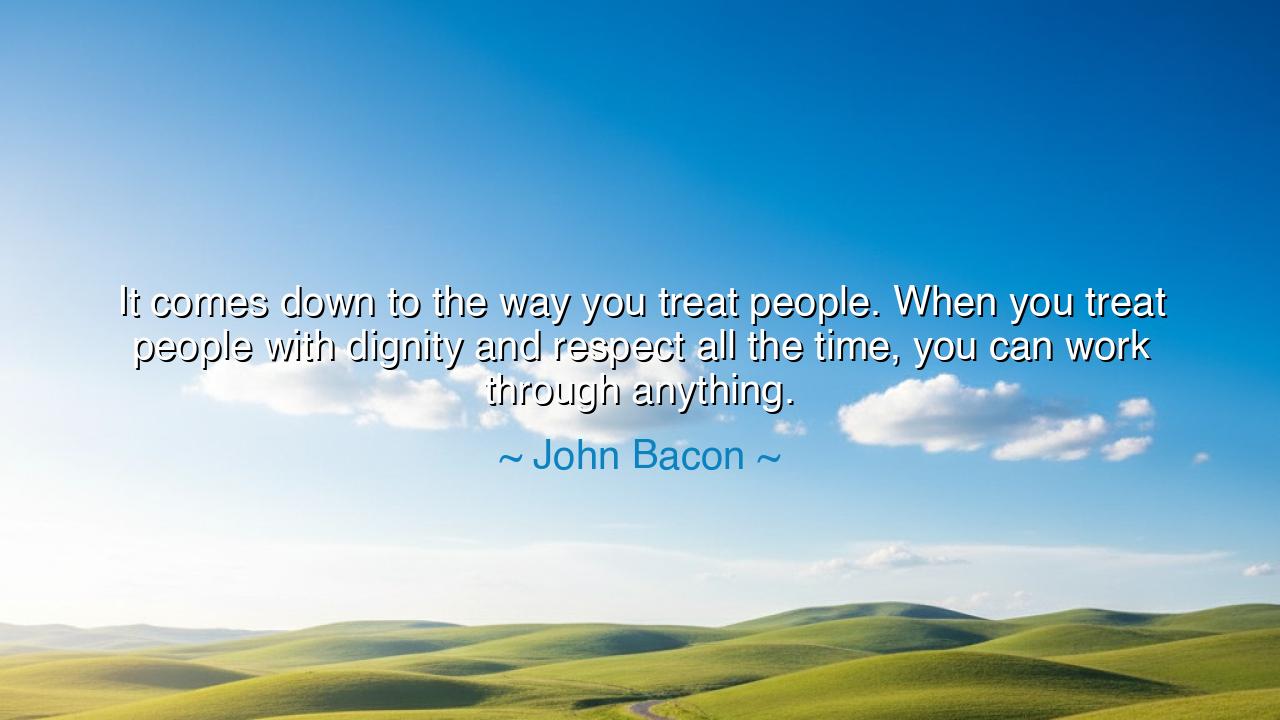
It comes down to the way you treat people. When you treat people
It comes down to the way you treat people. When you treat people with dignity and respect all the time, you can work through anything.






"It comes down to the way you treat people. When you treat people with dignity and respect all the time, you can work through anything." These words by John Bacon carry with them a timeless and universal truth—respect and dignity are the foundations upon which all enduring relationships and great achievements are built. In this simple yet profound statement, Bacon speaks not just of interactions between individuals but of the deeper humanity that binds us all together. To treat others with dignity and respect is to honor their worth, to see them as equals, and to offer them the same compassion we would seek for ourselves. It is in this spirit that the strength to overcome obstacles, to face challenges together, is found.
In the stories of the ancients, we see this truth play out in the actions of kings, warriors, and philosophers alike. Alexander the Great, despite his military prowess and conquests, was known to show great respect to the cultures he encountered, often adopting their customs and showing dignity to the leaders he conquered. It was said that his treatment of his enemies was marked by respect and fairness, and through these acts, he earned loyalty and forged alliances that helped him in his campaigns. He understood that the foundation of true power lies not in the subjugation of others, but in the mutual respect and understanding that can bring people together, even in times of conflict. In this way, respect became a tool not only of diplomacy but of enduring leadership.
The great philosopher Confucius also spoke of the importance of respect and dignity in his teachings. He believed that the harmony of society rested on the respectful conduct of individuals toward each other, especially between those of different statuses. The ruler, he taught, must show dignity to his subjects, and in turn, the subjects would offer their loyalty and cooperation. In his Analects, Confucius states, "The superior man is dignified but not proud; the inferior man is proud but not dignified." This balance of dignity and respect creates a foundation of mutual trust, which in turn fosters an environment where challenges can be overcome with collective effort.
Bacon’s words remind us that no matter how great the trials we face, if we approach others with respect and dignity, we will find the strength to endure. Take, for example, the great Nelson Mandela, who, after spending 27 years in prison, emerged not with bitterness, but with a commitment to respect and reconciliation. Mandela’s ability to treat even his captors with dignity and respect allowed him to bridge divides and heal a deeply fractured nation. His actions teach us that, even in the face of unimaginable adversity, treating others with respect can create the conditions for peace and understanding. By offering respect, we empower others to respond with the same, breaking down the barriers that separate us.
History is full of stories where the power of respect transformed situations and united people in ways that brute force or fear could never accomplish. Consider the legendary Mahatma Gandhi, who used non-violence and the power of respect for others to lead India to independence. Gandhi’s philosophy was rooted in the belief that respect for every human being, regardless of their race, caste, or background, was the key to freedom. His ability to show dignity to his adversaries, even in their harshest moments, allowed him to win hearts and minds, turning opponents into allies. In this way, respect became not just a moral duty but a transformative force for good.
What Bacon is conveying through his words is the enduring truth that when we treat others with dignity and respect, we create the foundation for unity and cooperation, no matter the challenges we face. In this, we see the power of simple acts—speaking kindly, listening attentively, offering a hand in times of need. These small but profound actions build the trust and goodwill that make it possible to work through the most difficult of times. Without respect, without dignity, the walls between us grow higher, and conflict becomes inevitable. But when we choose to treat others as equals, with honor and compassion, we tear those walls down.
The lesson for us, then, is clear: treat others with respect and dignity in all things, and we will find the strength to face any difficulty together. Whether in our personal lives, in our workplaces, or in the world at large, it is this spirit of mutual respect that allows us to overcome the challenges that inevitably arise. To act with dignity is to recognize the inherent worth of every person, and in doing so, we foster a world in which cooperation and understanding can flourish. As we move through life, let us remember the timeless wisdom of John Bacon and the ancients, who knew that respect is the true foundation of all that is good and lasting in this world.






AAdministratorAdministrator
Welcome, honored guests. Please leave a comment, we will respond soon